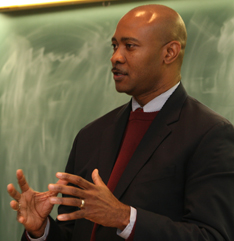The rise of the Internet poses significant challenges to daily newspapers, but the threat is more real in television news according to St. Petersburg Times Managing Editor Stephen Buckley.
Buckley spoke Wednesday about the Internet and its impact on the newspaper industry during the Multicultural Festival at Wabash. Click here for photos from the Festival.
"Video is the straw that stirs the Internet’s drink these days," Buckley said. "YouTube is the fastest growing site in the history of the Internet. Sixty percent of the videos on the Internet are posted on YouTube.
"The Internet poses a much more urgent threat to television news than to newspapers."
 Buckley began by suggesting he was a fan of both the Internet and blogs, but reminded the Wabash audience that rumors, half-truths, and lies spread far more rapidly in the age of the Internet than through normal investigative reporting.
Buckley began by suggesting he was a fan of both the Internet and blogs, but reminded the Wabash audience that rumors, half-truths, and lies spread far more rapidly in the age of the Internet than through normal investigative reporting.
The challenge for newspaper editors and publishers, he said, is to be both immediate and factual, which is one reason his paper, the St. Petersburg Times, has invested more resources in investigative reporting than ever before.
"The immediacy of the Internet is a wonderful blessing, but there are many, many challenges that go with that. Now deadlines are 24 hours a day and seven days a week… Every moment is a deadline," he said.
"Sorting out what’s news and what’s false is our biggest challenge."
Buckley explained members of his newspaper’s staff had uncovered information that suggested embattled Florida Congressman Mark Foley was having inappropriate relationship with a Congressional page a year before the news broke nationally. When the public found out, he said, the newspaper was criticized for not breaking the story.
Buckley’s editorial dilemma was the risk of not having enough information to go public. Had the paper done so and been wrong, it would have tarnished the Representative's reputation along with the newspaper’s history of good, investigative journalism.
"We’re [newspapers] all playing the same game; we’re all trying to get the news on our sites as fast as possible. And frankly, the stakes have never been higher.
"Immediacy has its price. Sometimes you put something on your web site and it’s wrong," Buckley said.
Newspapers have a history of printing retractions or corrections when they have published inaccurate information. Corrections, he said, are rarely — if ever — made on television news or the Internet.
Buckley also told the audience about the story of Steve Stanton, the former City Manager of Largo, Florida. The St. Petersburg Times learned Stanton was preparing to undergo gender reassignment surgery, but was asked by Stanton to hold the story until he could tell members of his family.
Buckley made the editorial decision to post the story a day later on the newspaper’s website, Tampabay.com. Within hours, the story had received over 100,000 hits. The next day it was front-page news.
The public, he said, was critical of the paper "outing" the city manager, who was eventually dismissed from the position he held for 14 years. Buckley defended the decision, saying, "The man was a public employee making $140,000 a year of tax payer money. The public had the right to know.
"It was an easy decision."
Not all editorial decisions are so easy, he said.
"The public is increasingly obsessed with the merely interesting … we’re driven to the sexy, the hyper-relevant, and the bizarre," said Buckley when citing a half-dozen pseudo-news headlines from the Internet.
"When should the public good trump public voyeurism? There are no easy answers."
The future of newspapers is sound, according to Buckley, because of the sense of responsibility they have to inform the public and hold government accountable.
"As long as people care about preserving our democracy, newspapers will have a place. Because if newspapers won’t look out for the public good, who will?"